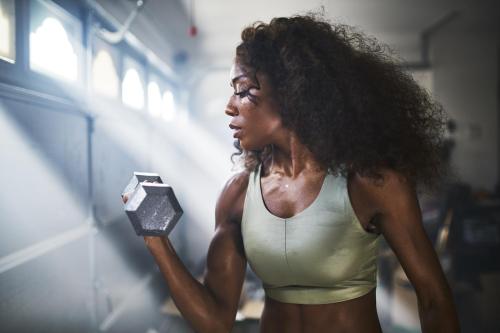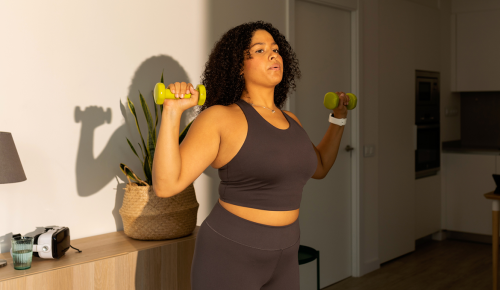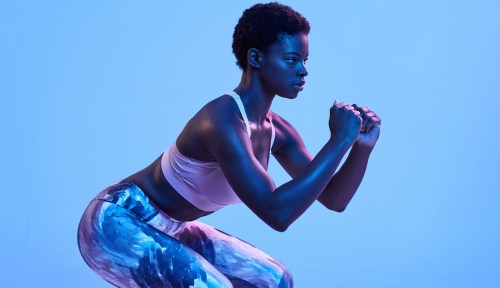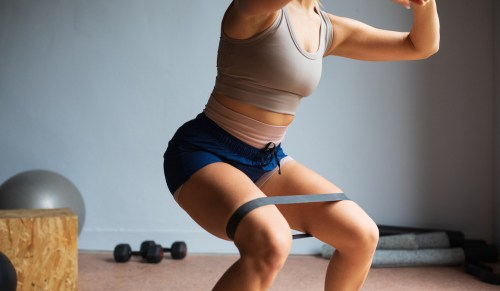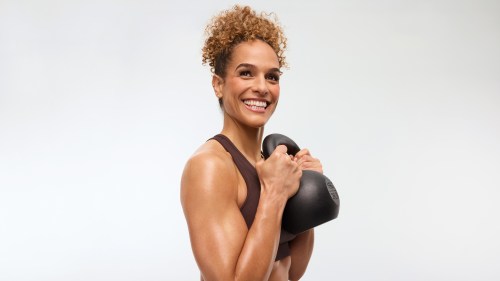Whenever I’m doing a strength training workout, I alternate between several trusty arm exercises, butt-sculpting moves, core, and lower body sequences. But something that changes all the time is whether I use my own bodyweight to train with, or actual weights.
I really just choose depending on my mood, or whatever the instructor in my workout streaming app tells me to do. But, newsflash to my aloof self: Bodyweight and regular weights in workouts are used for very different purposes. “Looking at many of the top athletes in the world from different sports, one could make the argument in both directions that bodyweight training is superior to weight training or vice versa,” says Andy Speer, Peloton Tread instructor (Peloton Digital BTW has a ton of classes you can stream on-demand that use both methods).
He says to think about Olympic gymnasts and weightlifters as examples: “Gymnasts rarely lift weights, but perform unbelievable feats of strength and explosiveness,” says Speer. “Olympic weightlifters use a weighted barbell for the majority of their training and are able to lift more weight over their head than any other athlete.” So really, when choosing between the two methods, it really all comes down to your particular goals. Keep scrolling for why you’d choose one over the other (and why it could be good to add both into the mix), according to the pros.
Bodyweight training
Chances are you’ve done plenty of bodyweight exercises (ahem: yoga). The tricky thing about these, however, is that even though they don’t require dumbbells or anything, they can still be challenging. Bodyweight training comes with a load of unique benefits that lifting heavy weights doesn’t offer. “Bodyweight training develops body control and keeps your joints healthy,” says Speer. “Probably the most important aspect of it is development of spacial awareness and body control. The ability to run, crawl, jump, balance on one foot, push and pull-up are critical to maintaining health and athleticism long term, and can all be developed at a foundational level.”
They’re also boosting your coordination. “Bodyweight training in linear movements maximizes bodyweight strength and body control, and helps make you strong and flexible while improving your coordination,” says Phil Timmons, program manager at Blink Fitness. Besides that, you’re helping out your joints. “A main benefit of bodyweight training is joint mobility,” says Speer. “Developing the ability to articulate the joints of your body is often overlooked. The ability to focus on finite movements will expand your competency in gross movements (like squats, lunges, and push-ups) and reduce your risk of injury due to over-compensation.”
On a more obvious and convenient level, bodyweight training is something you can do anywhere. “If someone wants to workout at home and doesn’t have any weights, using bodyweight can still provide a good and challenging workout,” says Danielle Weis, PT, DPT, OCS, physical therapist and clinical director of Spring Forward Physical Therapy. Timmons adds that it’s also beneficial because equipment and the cost of equipment are not a factor (a true perk indeed).
Weight training
Using actual weights is equally great for your fitness game, but is more useful for those looking to build muscle. “Traditional weight training helps increase your maximum strength and the hormones that build muscle,” explains Timmons. According to Speer, building strength through weights will “improve almost every aspect of your life and training.” Like, everything from running to schlepping heavy bags will become easier the stronger you become.
“Increasing your trap bar dead lift strength, for example, will carry over to increasing the force you produce in each step of your running stride,” says Speer. “You’ll gain more force, more distance covered per step, a faster time. If you can curl two 20-pound dumbbells, then lifting your child will be a breeze. Those are simple everyday examples.”
Weights will also apply useful stress to your body which will result in a load of health benefits: “Using weights applies stress to tendons and ligaments similar to the plyometric forces of sports and running,” says Speer. “By strengthening your connective tissue through weight training, you’re less likely to be injured during a basketball game or during a run. And, looking at health and longevity, weight training improves bone density and maintains lean muscle mass.”
Also, unlike using just your bodyweight, you can control how much you’re lifting and know when you’re getting stronger. “Using dumbbells or barbells enables you to adjust the weight to challenge your muscles,” says Dr. Jason Karp, author and coach and chief running officer of Run-Fit. Hence that satisfying feeling of moving up from, say, 12 pounds to 15 pounds in your bicep curls.
When you should do both
Of course, it’s also totally fine and great to mix up your workout routine between using weights and working with your bodyweight. “If your goal is to improve health, be generally athletic, and feel good about the way you look and move, then a combination of weight training and bodyweight training is your best bet,” says Speer, noting that if you only weight train, for instance, your overall movement capacity and athleticism may be limited.
Also, using both weight methods will increase your relative and absolute strength. “Relative strength is the term used to describe your strength relative to your bodyweight, meaning how many pull-ups or push-ups you can perform, or how fast you can run a mile,” says Speer. “Absolute strength is a measure of how much actual weight you can lift, an external load, meaning your dead lift, squat, or shoulder press. Both are very important measures of fitness and for your overall health and athleticism.” So get you a workout that lets you do both.
Sign Up for Our Daily Newsletter
Get all the latest in wellness, trends, food, fitness, beauty, and more delivered right to your inbox.
Got it, you've been added to our email list.
